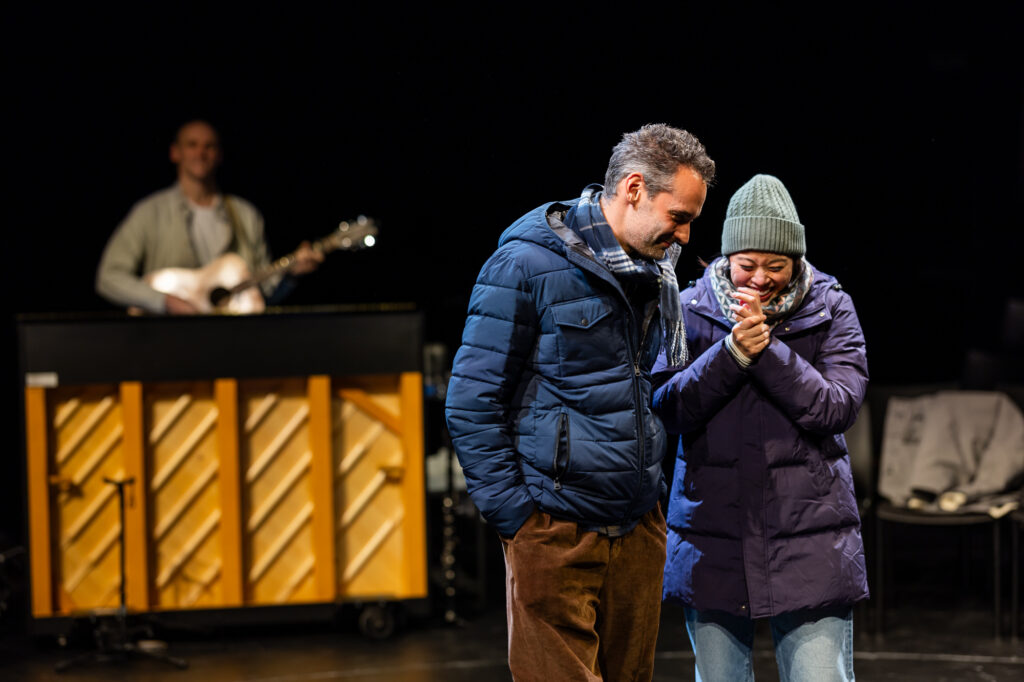
Jonathan Raviv and Brooke Ishibashi in “Night Side Songs” at Under the Radar’s “Under Construction.” Photo: Nile Scott Studios and Maggie Hall
Presented by American Repertory Theater in association with Philadelphia Theatre Company
Words and music by Daniel Lazour and Patrick Lazour
Directed by Taibi Magar
Music Direction and Piano Arrangements by Alex Bechtel
Featuring: Jordan Dobson, Robi Hager, Brooke Ishibashi, Johathan Raviv, Mary Testa
March 27 – April 20
At the Cambridge Masonic Temple from March 27 – April 6
At Hibernian Hall, April 8 – 20
Tickets and information here
Content Advisory: This production contains descriptions of cancer treatments as well as discussions of grief, loss of a parent, and terminal illness. Recommended for ages 15+.
Review by Maegan Bergeron-Clearwood
CAMBRIDGE, Mass — Night Side Songs is not a religious story, but it is the closest I have ever come to having a spiritual experience in the theatre.
This production by the Lazour brothers, aptly described by the A.R.T. as a “communal music-theater experience,” is simultaneously concerned with the benign materiality and ineffable transcendence of human existence. In one moment, central character Yasmine (Brooke Ishibashi) discusses her love of Velveeta mac-and-cheese; in another, she contemplates the unfathomable smallness of existence – two distinct but equally holy experiences.
This juxtaposition between intimacy and existentialism is part of what makes Night Side Songs feel so sacred. On its surface, this is a story about illness, an inevitable stage of existence that essayist Susan Sontag described as the “night side of life.” The play follows Yasmine, a woman with breast cancer, and the caregivers who accompany her on her journey from diagnosis to treatment to remission and beyond. Unwillingly, they are swept up in the cold, clinical world of American healthcare: scenes are punctuated by lengthy descriptions of side effects and insurance bills, and the play doesn’t shy away from depictions of grief and suffering.
But ultimately, Night Side Songs is about recognizing the humanity of every individual – both onstage and off. The production is staged in the basement of the Masonic Temple in Cambridge (it moves to Hibernian Hall in Boston on April 9th); no proscenium, no spectacle, house lights on. The production would feel like a workshop reading, if it weren’t for the clear intentionality behind these artistic choices. Stripping the space of any barriers between performers and spectators amplifies the sense of vulnerability in this already unflinching story; the audience has no choice but to witness what we are seeing and hearing, including each other.
Spectators are invited to regularly sing along using a lyric sheet, at one point described as a hymnal. In my past experiences, any mention of audience engagement is met with eye rolls or flat-out refusal, but here, it is framed as a gentle invitation: a performer informed us of what we could expect from the experience, said there was no pressure to sing along, and pointed toward exit doors in case we needed to take a break mid-show (a refreshingly consent-based approach to audience interactivity that I appreciate).
In the production I saw, most of the audience sang upon request (conducted by ensemble-member Robi Hager), but eventually, no invitation was needed. In one early scene, Yasmine’s mother (Mary Testa) sat by her daughter’s bedside, unsure of what to say or do, so she started a soft rendition of Cindi Lauper’s “Time After Time”; unbidden, the audience joined in, a testament to the strangely universal power of music, and a moment that lingered with me long after I went home.
Night Side Songs is a transfixing production, despite the bare space. The ensemble, directed by Taibi Magar, cycles through different characters with ease, bringing entire locations and time periods to life with pantomime and movement. The performers are emotive and energetic, a musical theatre-esque approach that doesn’t always gel with the intimate setting. Still, there is enough corniness in the Lazour brothers’ text (alongside plenty of lyricism and metaphor) that the performers can pull off most of what the play needs. Musically, all five of the performers sound exquisite, bringing the conversational, folksy composition to life with ease.
But the most unique visual aspect is what surrounds the performance itself. The night of my attendance, audience members variously hummed along, leaned into each other’s arms, chortled, and wept, all in full view of each other. Occasionally, I found myself locking eyes with a stranger across the brightly lit room, an experience that might otherwise feel awkward, but here felt vulnerable and warm.
Gently but firmly, Night Side Songs confronts us with the harsh realities of sickness and death. It also asks us to deeply look into our neighbor’s eyes and contemplate the unfathomable depths of personhood staring back at us. This is not a play about God or the afterlife, but it is unmistakably, humanly, divine.

Leave a Reply
You must be logged in to post a comment.